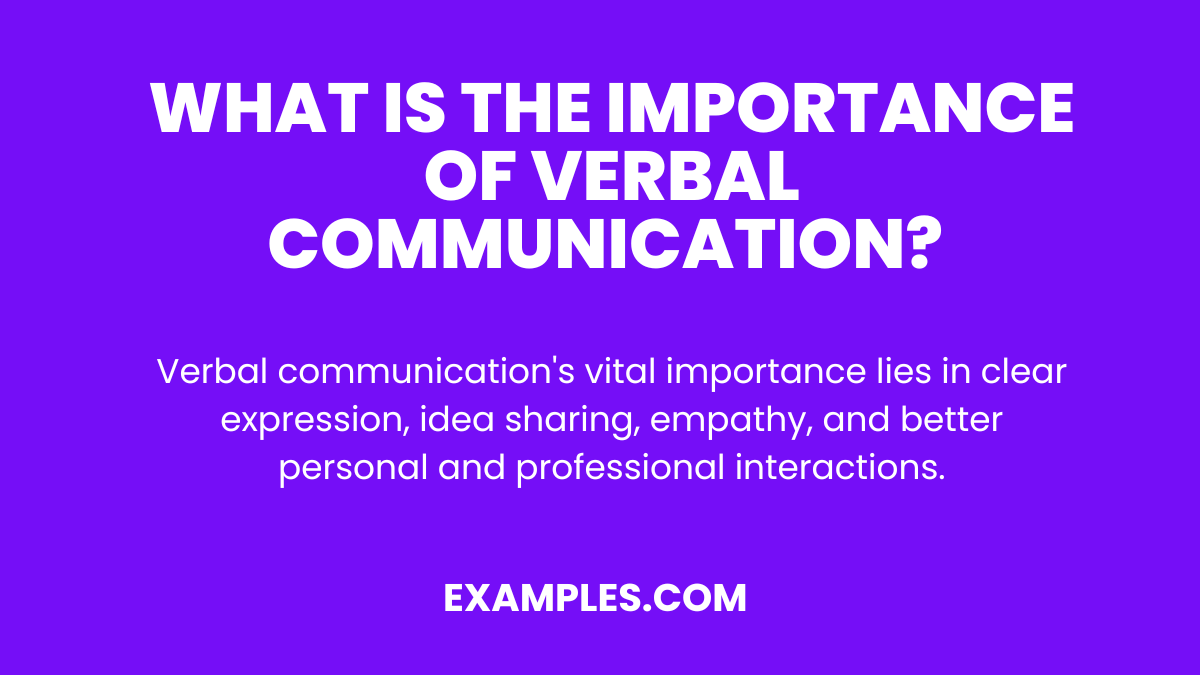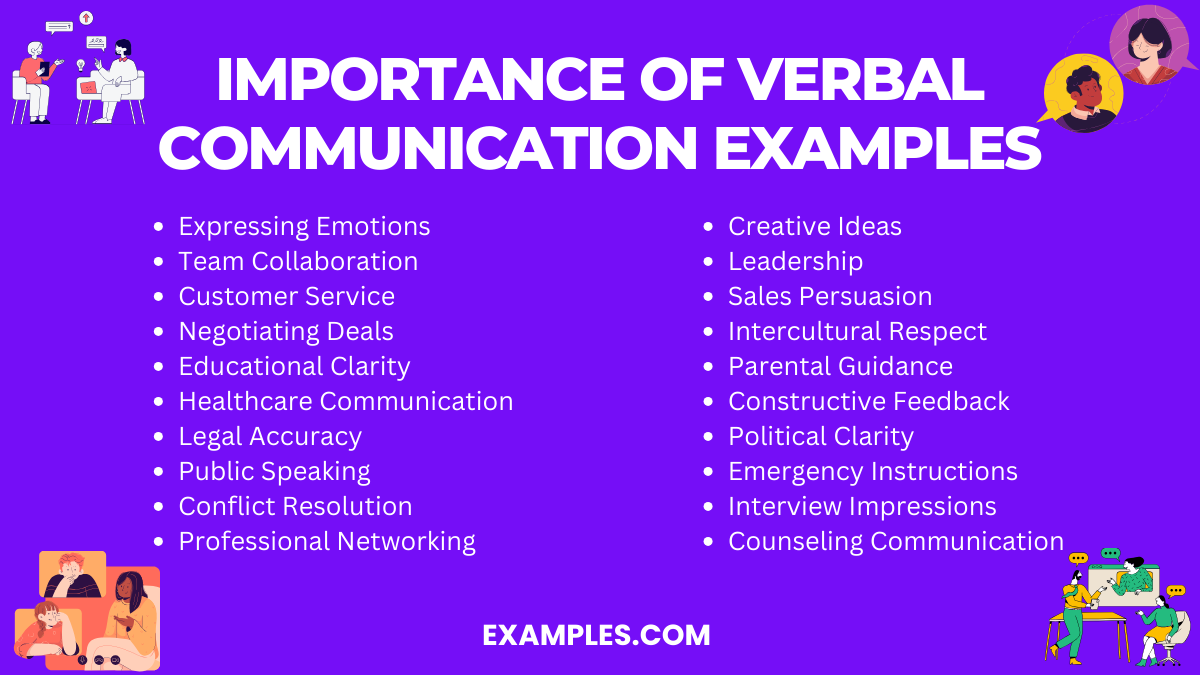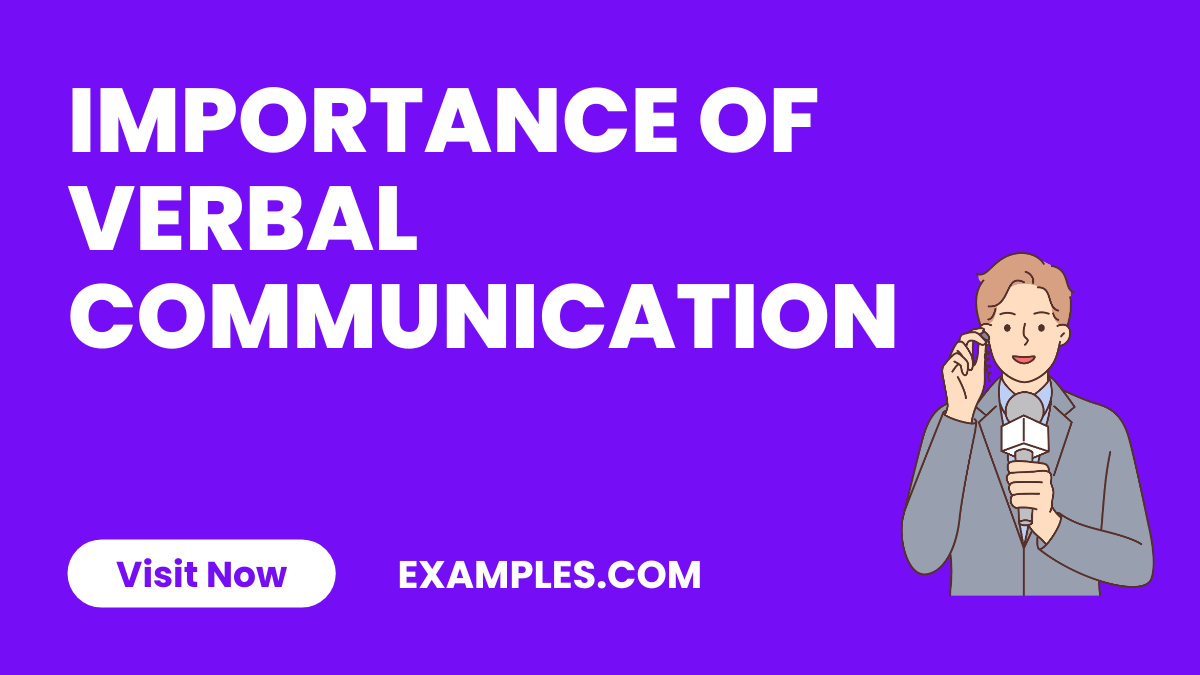19+ Importance of Verbal Communication Examples
Unlock the secrets of effective interaction with our comprehensive guide on the Importance of Verbal Communication. Delve into a world of Communication Examples that demonstrate the power of words in shaping thoughts, relationships, and successes. This guide offers insight into the art of expression, equipping you with the skills to convey your message effectively and make every word count.
Download Importance of Verbal Communication Examples PDF
What is the Importance of Verbal Communication? – Meaning

The importance of verbal communication lies in its ability to convey thoughts, emotions, and information clearly and effectively. It’s the cornerstone of human interaction that enables individuals to express ideas, negotiate, and build relationships. Good verbal communication means sharing ideas with precision and empathy, leading to better understanding, collaboration, and connection in both personal and professional contexts. It’s not just about speaking; it’s about being heard and understood.
20 Importance of Verbal Communication Examples

Verbal communication is fundamental in all aspects of life. Approximately 7% of our communication is verbal, with the rest being non-verbal or written, yet its impact is profound. Understanding Verbal Communication Examples and mastering Verbal Communication Techniques can significantly enhance personal and professional interactions. This guide not only explores the What Percent of Communication is Verbal, Advantages and Disadvantages of Verbal Communication but also delves into its various functions and types. By enhancing your Verbal Communication Skills, you can navigate complex situations and relationships more effectively. Here are 20 examples illustrating the importance of verbal communication, what causes issues, and how to fix them:
- Expressing Emotions: Choose empathetic language for clear emotional expression.
- Team Collaboration: Use specific, clear instructions for effective teamwork.
- Customer Service: Employ positive language for customer satisfaction.
- Negotiating Deals: Strategic, clear language leads to better business outcomes.
- Educational Clarity: Simplify concepts for better student understanding.
- Healthcare Communication: Use layman’s terms for patient care clarity.
- Legal Accuracy: Ensure precise language in legal settings.
- Public Speaking: Dynamic delivery influences and engages audiences.
- Conflict Resolution: Neutral language resolves misunderstandings effectively.
- Professional Networking: Articulate speech creates connections and opportunities.
- Creative Ideas: Vivid language shares ideas effectively.
- Leadership: Consistent, inspiring communication guides teams.
- Sales Persuasion: Clear, engaging language informs customers.
- Intercultural Respect: Understand cultural nuances in conversations.
- Parental Guidance: Consistent messaging sets clear expectations.
- Constructive Feedback: Specific and focused critiques improve performance.
- Political Clarity: Factual, straightforward language influences debates.
- Emergency Instructions: Direct, calm communication is key.
- Interview Impressions: Clear, relevant responses showcase qualifications.
- Counseling Communication: Empathetic listening aids therapeutic progress.
Importance of Verbal Communication for Students
Effective Verbal Communication for Students to excel academically and socially. It empowers students to articulate ideas, ask insightful questions, and engage in meaningful collaboration. As students master these skills, they pave the way for success in diverse fields, from law enforcement to Verbal Communication in Healthcare, catering to unique needs including those with autism.
- Asking Questions in Class: Encourages curiosity and deeper understanding.
- Prompt students to inquire actively for comprehensive understanding.
- Explaining Answers: Enhances learning by articulating reasoning.
- Encourage clear and detailed explanations of thought processes.
- Peer Mentoring: Older or more knowledgeable students guide others.
- Foster a supportive learning environment through mentoring and guidance.
- Adapting Communication for Autism: Tailoring language and tone for inclusivity.
- Adjust communication strategies to support students with autism effectively.
- School Announcements and Leadership: Developing public speaking and leadership skills.
- Encourage taking on roles that build confidence and communication prowess.
Importance of Verbal Communication at Workplace
In the professional world, Essential Communication and Communication Style for collaboration, leadership, and customer relations. It facilitates clear instructions, feedback, and the resolution of conflicts, thereby enhancing productivity and fostering a positive work environment.
- Team Meetings: Clearly articulating thoughts and ideas during team discussions.
- Offer constructive suggestions and clear insights for collaborative problem-solving.
- Leadership Communication: Leaders inspiring and guiding their teams.
- Use motivational language to align and energize the team towards common goals.
- Client Negotiations: Persuading and understanding client needs for successful deals.
- Articulate the benefits and listen actively to client concerns.
- Handling Conflicts: Addressing and resolving Verbal Communication in the Workplace disputes.
- Encourage open, respectful dialogue to resolve conflicts.
- Professional Networking: Building and maintaining a network of professional contacts.
- Initiate conversations with a clear intention and open mindset for networking opportunities.
What are the key factors that highlight the importance of verbal communication in conflict resolution?
Resolving conflicts effectively is crucial in maintaining healthy relationships and work environments. Verbal communication plays a pivotal role in understanding issues, expressing thoughts, and reaching amicable solutions.
- Clarity and Precision: Clear and precise communication ensures that all parties understand the issues at hand, reducing misunderstandings and focusing on the resolution. Verbal Communication in Law Enforcement – Officers are trained to use clear and direct communication to de-escalate conflicts effectively.
- Active Listening: Active listening is a vital aspect of verbal communication, allowing parties to feel heard and understood, which can significantly reduce the tension in conflict situations. Verbal Communication for Autism – Tailoring communication strategies to include active listening can significantly improve interactions with individuals with autism.
- Empathy and Understanding: Communicating with empathy involves acknowledging others’ feelings and perspectives, fostering a sense of mutual respect and understanding. Verbal Communication for Teachers and students benefit from empathetic communication, leading to more effective conflict resolution.
- Non-Verbal Cues: Verbal communication is often accompanied by non-verbal cues. Being aware of and responding to these cues can enhance the effectiveness of conflict resolution. How to Improve Verbal Communication Skills – Training in both verbal and non-verbal aspects can greatly improve overall communication abilities.
- Solution-Oriented Dialogue: Focusing the conversation on finding a solution rather than dwelling on the problem encourages constructive dialogue and a quicker resolution. Why you need Verbal Communication Skills – Strong verbal skills are indispensable in navigating and resolving conflicts in personal and professional settings.
What is the importance of verbal communication in personal relationships?
Brief Explanation: Verbal communication is the cornerstone of building and maintaining strong personal relationships, facilitating deeper connections, and understanding.
- Expressing Feelings and Needs: Open and honest communication allows individuals to express their feelings and needs clearly, strengthening bonds and mutual understanding. Verbal Communication in Law Enforcement Clear communication is essential in managing personal relationships within high-stress professions like law enforcement.
- Building Trust: Consistent and truthful verbal communication builds trust, an essential element in any personal relationship. Verbal Communication for Autism, Specially tailored communication approaches are crucial in building trust with individuals with autism.
- Conflict Management: Effective verbal communication skills are key in addressing and resolving misunderstandings and conflicts in a constructive manner. Verbal Communication for School emphasize verbal communication skills to help students navigate personal relationships effectively.
- Continuous Learning and Growth: Through verbal communication, individuals can share experiences, knowledge, and feedback, contributing to continuous personal growth and learning. How to Improve Verbal Communication Skills continuous improvement of verbal communication skills is beneficial for personal development.
- Emotional Support: Verbal communication provides a means for offering comfort and support, showing empathy and understanding in personal relationships. Why you need Verbal Communication Skills, effective verbal communication is essential for providing emotional support and maintaining strong connections in relationships.
How Can One Enhance the Importance of Verbal Communication in Public Speaking?
To enhance verbal communication in public speaking, practice clarity and conciseness, adhering to the Rules of Verbal Communication. Engage audiences with a mix of Verbal vs Oral Communication techniques.
What Are the Educational Benefits Associated with the Importance of Verbal Communication?
Educational benefits include improved comprehension and expression, critical thinking, and collaboration. It leverages various Types of Verbal Communication for effective learning and information exchange.
In What Ways Does the Importance of Verbal Communication Contribute to Effective Leadership?
Effective leadership through verbal communication involves clarity, motivation, and vision sharing is Ways to Improve Verbal Communication Skills. It contrasts Verbal vs Written Communication, using direct interaction for immediate impact in Verbal Communication in Business and Healthcare.
In conclusion, the multifaceted Functions of Verbal Communication resonate across diverse domains, including healthcare. Its pivotal role in facilitating understanding, fostering connections, and promoting effective healthcare delivery cannot be overstated. By harnessing the power of verbal communication, individuals can bridge gaps, convey critical information, and ensure quality healthcare services, ultimately improving patient outcomes and well-being.



